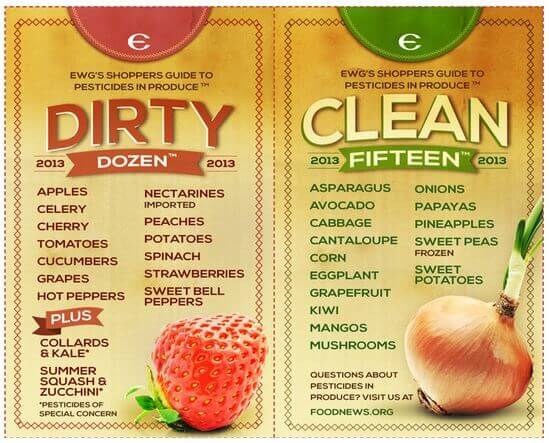
The ‘DIRTY DOZEN’ – The Most Pesticide-Laden Fruit And Vegetables In The U.S
The Environmental Working Group (a non-profit organisation in the U.S., specialising in environmental research and advocacy) released their 9th annual report of their Shopper’s Guide to Pesticide in Produce. Part of that report includes their Dirty Dozen, their list of the twelve crops that contained the most pesticide residue. The EWG strongly recommend that people buy these items as certified organic to lower their pesticide intake.
Actually, for the second year in a row, they decided to rename this list as the Dirty Dozen Plus, so they could highlight two additional crops that, although they didn’t meet the Dirty Dozen criteria, they raised special concerns as they “were commonly contaminated with pesticides exceptionally toxic to the nervous system.”
Unfortunately there currently is no Australian equivalent to this exceptionally informative study (the results are based on an analysis of more than 28,000 samples of 48 popular fruit and vegetables tested by the U.S.D.A. and the F.DA.), however, there are often similar practices in Australian non-organic agriculture. So although the research is not about the Aussie market, it is still food for thought.
So here they are:
- Apples
- Celery
- Cherry Tomatoes
- Cucumbers
- Grapes
- Hot Peppers (Chillies)
- Imported Nectarines
- Peaches
- Potatoes
- Spinach
- Strawberries
- Capsicum
And the two additional mentions of concern are:
- Kale and Collard greens (Cabbage and Broccoli)
- Summer Squash (Zucchini)
If you were wondering, the data that is used to create this report is from produce that is tested as it is typically eaten. This means it has been washed and, when applicable, peeled before they run the tests.
Also, these tests are not finding one single type of pesticide. In fact, 11% of the samples analysed for this guide had residues of five or more different pesticides.
The EWG recommends buying organic whenever possible, and so do we.
Not only is it smart to reduce your exposure to pesticides, but buying organic sends a message that you support environmentally friendly farming practices that minimise soil erosion, and protect water quality and wildlife.
